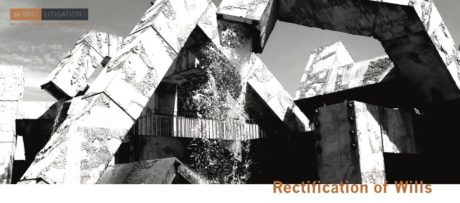In Canada (Attorney General) v. Fairmont Hotels Inc., 2016 SCC 56 (and its Quebec civil code counterpart Jean Coutu Group (PJC) Inc. v. Canada (Attorney General), 2016 SCC 55), the Supreme Court of Canada shook up the tax world by limiting the availability of rectification to prevent unwanted tax consequences. These decisions will undoubtedly have a large impact in the area of tax law. However, it does not appear that the law of rectification vis-à-vis wills will be impacted.
In Fairmont, a hotel management corporation (Fairmont) helped a real estate trust finance the purchase of two American hotels. Fairmont, the trust and their subsidiaries entered into a complex agreement in order to ensure foreign exchange tax neutrality. After Fairmont was acquired by another party, the new owner requested that this agreement be terminated through a share redemption (as this agreement was somehow preventing the sale of the hotels). Based on the incorrect assumption that the tax neutrality issue had been resolved, Fairmont’s subsidiaries complied by passing directors’ resolutions redeeming certain shares. Unfortunately, this resulted in an unanticipated tax liability.
Fairmont applied to rectify the directors’ resolutions from a redemption of shares into a loan, which would apparently nullify the unanticipated tax liability.
Before Fairmont, the leading case on rectifications in the tax context was the Ontario Court of Appeal’s decision in Attorney General of Canada v. Juliar, 2000 CanLII 16883. This decision allowed rectification where two parties entered into an agreement with a common continuing intention to achieve a specific tax outcome. If the parties were mistaken and the transaction did not achieve the specific tax outcome, the agreement could be rectified to achieve that specific tax outcome. Under the logic in Juliar, Fairmont’s rectification should have been approved (and, in fact, was so by the application judge and Ontario Court of Appeal – both citing Juliar as binding precedent).
However, the Supreme Court expressly overturned Juliar in Fairmont. Writing for the 7-2 majority, Justice Brown summarized the law of rectification. Justice Brown expressly noted that the test was to be applied in a tax context just as in a non-tax context. If a legal instrument did not accord with the true agreement due to a mistake (e.g. because a term has been omitted, an unwanted term included, or a term incorrectly expresses the parties’ agreement) a court could rectify this instrument so as to make it accord with the parties’ true agreement.
Rectification is a powerful tool but is only available to modify an instrument, not the underlying agreement. Rectification aligns the instrument with what the parties agreed to do, and not what, with the benefit of hindsight, they should have agreed to do.
Whether or not CRA receives a “windfall” is irrelevant; tax consequences spring from how the underlying agreement was structured. As Justice Brown pithily observed, rectification is not equity’s version of a mulligan.
It does not appear that Fairmont will change the law of rectification regarding wills, as it brings the tax context in line with that of the will context. As Justice Belobaba held in Robinson Estate v. Robinson, 2010 CarswellOnt 4576 (S.C.J.): “Anglo-Canadian courts will not rectify a will to correct the testator’s mistaken belief about the legal effect of the words he [or she] reviewed and approved.”
Nonetheless, estate planners should carefully consider the decision in Fairmont. Often a will is only one way that wealth is passed from one generation to the next. If a trust is set up to achieve a specific tax outcome and does not do so due to a mistake, the parties will not get a mulligan to redo it.

